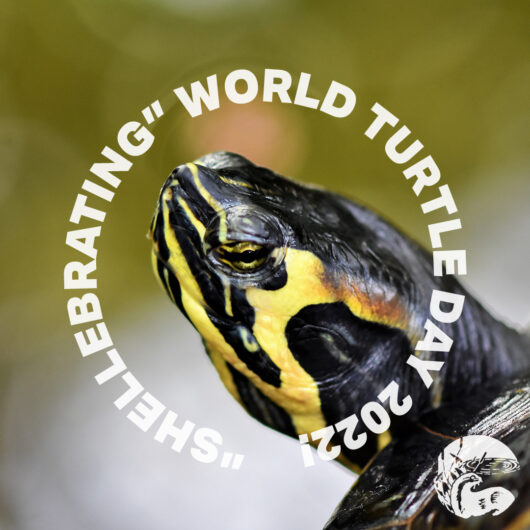MWC “Shellebrates” World Turtle Day!
By Jo-Anne Goodwin and Warren Goodwin.

On the beach, on the roads, or on a log, cottagers and locals alike are thrilled yearly by the sightings of one of our few native reptiles – the turtle. Often we don’t give our shelled friends much thought, but this year Muskoka Watershed Council is encouraging residents of the region to “Shellebrate” these important and fascinating fellow lake-lovers on World Turtle Day, May 23rd.
Turtles, a Keystone Species
Turtles are essential to the health of Muskoka’s ecosystems, and all eight endemic varieties are recognized as “keystone species”. A keystone species is an animal whose role in the food-web is essential to an entire chain of linked species, habitats, and ecosystem services. Without them, and the specific role they play, other species populations and ecosystem functions can be compromised – the ecosystem can collapse.
Turtles are water quality specialists, removing sources of harmful bacteria from our waterways and maintaining fish populations. Along with invertebrates like worms and crayfish, turtles eat carcasses of fish and animals that die in lakes and wetlands. They also eat many aquatic plants, spreading their seeds as they travel wetlands and lake shores.
According to Turtle Guardians, over 70% of Ontario’s wildlife depends on wetlands and shore lands, therefore by protecting turtles we inevitably also help the majority of our native wildlife…which along with good water quality, supports our wellbeing too!
Population Critically in Decline
Despite being long-lived, the success rate for a turtle to hatch and reach maturity is just 0.06%, underscoring the importance of every single turtle to the survival of the entire population.
However, turtles of all ages are increasingly killed on roads, removed from nature for pets, poached, or deliberately killed. It is estimated that less than 50% of the turtle population in Ontario remains, and the loss of just 20% more of our Snapping turtle populations could result in their extinction in 20 years. Snapping turtles may be the best cleaning crews and biodiversity agents we have, and our lakes will suffer greatly without them.
The American Tortoise Rescue (ATR), a nonprofit organization established in 1990 to fight for the protection of all species of turtles and tortoises, is organizing the 22nd World Turtle Day and this year the theme, “Shellebrate!”, asks us all to reconsider our relationship with these special natural residents.
How Can You “Shellebrate”?
Muskoka’s turtles need your help!
- Be vigilant when driving to avoid hitting turtles crossing the road. If it is safe to do so, stop and help the turtle cross the road in the direction it was heading. If you take it back from where it came, it will turn and cross again.
- Support local government officials that are helping to stop the filling of wetlands and development that causes habitat fragmentation.
- Report poaching of turtles for food or for the black-market pet trade. It is illegal in Canada.
- Support climate change initiatives, personally and politically. Turtles are very sensitive to temperature changes and habitat loss.
- Help stop pollution, especially where turtles are found.
- Help stop the spread of invasive species. New invasive species can invade a turtle’s habitat and push out the plants and animals that are part of a turtle’s ecosystem.
- Report turtle sightings to help conservation efforts. They can be reported to the Ontario Turtle Tally at https://report.adoptapond.ca/, the Turtle Guardians at https://ontarioturtle.ca/ourmission/drop-off, and the Herps of Ontario project on iNaturalist at www.inaturalist.org/projects/herps.
- Support the various agencies dedicated to conserving, protecting and rehabilitating turtles. A few that operate in the Muskoka area are:
- Scales Nature Park (“Saving Turtles at Risk Today” (START) – www.scalesnaturepark.ca
- Georgian Bay Turtle Hospital – https://gbth.ca
- Turtle Guardians – https://www.turtleguardians.com/
- Ontario Turtle Conservation – https://ontarioturtle.ca/
Turtle Island
Long before our boathouses and bunkies dotted the shores of our lakes, the Indigenous peoples of Muskoka had a very different relationship with local turtles. Though regional versions exist, the importance of the humble turtle was recognized as the core of multiple creation myths told and retold throughout North America.
The core of this story recalls a time when the planet was covered in water. Different native animals all tried to swim to the bottom of this prehistoric ocean to bring back dirt in order to create land, but all failed. A muskrat was the last animal to attempt the task. They swam deep and re-mained under water for a long time. Eventually the muskrat resurfaced with some wet soil in its paws.
Sadly, the epic swim took the muskrat’s life, but Nanabozho (a supernatural being who has the power to create life) took the soil and placed it on the back of a turtle. With this act, land began to form and so became Turtle Island – the landmass we now call North America.
~ Canadian Encyclopedia – November 6, 2018
